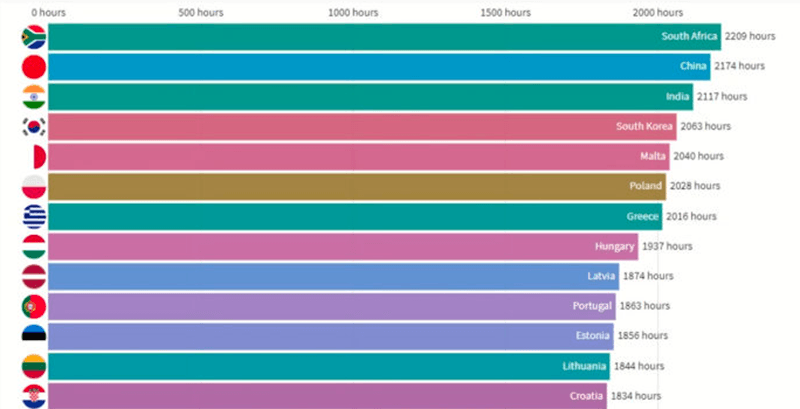
South Africa
Starting in 2023, 28 companies in South Africa piloted a 4-day week with no loss in pay.
4 Day Work Week in South Africa
Although South Africa does not officially work a 4-day work week, it recently marked a significant milestone in the ongoing global conversation about work-life balance with its pioneering 4-Day Work Week trial.
This initiative, which ran from March to August 2023, was the first of its kind on the African continent. The trial was coordinated by 4 Day Week Global in partnership with 4 Day Week South Africa NPC, and involved collaboration with researchers from Boston College and Stellenbosch Business School.
The South African pilot included 28 companies (27 in South Africa and one in Botswana). Some of the companies that agreed to be named publicly include:
South Africa
- Licia Dewing
- The OMG
- 2Stories
- APSO
- 3Verse
- Social Happiness
- EntruTech
- jt&a
- Elnatan IT Solutions
- Dream Team Catalyst
- KLA
- Semco Style Institute South Africa
- Marais Software Solutions
- Big Beard Web Solutions
- Valuesmart Business Solutions
- Social Impact Insights
- Intigrate Business Solutions
- Tax Maverick and The Tax Ladies
- Communicare
- Maties Gymnasium
- Nkwali Compliance Consultants
- IQbusiness
South Africa 4-Day Workweek Trial Results
Despite initial skepticism, the results were overwhelmingly positive, surpassing the expectations of both employers and employees.
Key results from the pilot program include:
- Increased mental health: 35% increase in employee mental well-being, highlighting the significant impact of a reduced work week on psychological health.
- Enhanced work ability: 49% of participants reported an increase in their work ability, demonstrating that a shorter work week can enhance productivity.
- Revenue growth: A 10.5% average increase in revenue was observed by many companies, suggesting that a more focused and rested workforce can drive better business outcomes.
- Reduced burnout: 57% decrease in employee burnout, addressing a critical issue many industries face and promoting healthier work environments.
- Lower absenteeism: 9% decrease in absenteeism, indicating higher engagement and presence of employees in their roles.
- High adoption rate: 92% of participating companies have decided to continue with the 4 Day Work Week post-trial, showcasing this approach's long-term viability and success.
The South African trial also demonstrated that a 4 Day Work Week could be implemented without compromising the quality of service provided to customers.
Companies like Elnatan IT Solutions and IQbusiness reported maintaining or even improving their service levels during the trial, showcasing that operational efficiency can be enhanced through better time management and work-practice reorganization.
4-Day Week Sector Trial in South African Higher Education
South African higher education is making history with the world’s first sector-specific 4-day week trial. This groundbreaking initiative targets university centres for student development and counselling, addressing the pressing need for better staff wellbeing and flexibility in the face of high burnout rates among psychosocial practitioners.
Following the success of Stellenbosch University’s 2024 pilot, which demonstrated how a reduced workweek can reduce burnout and enhance wellbeing, this trial aims to replicate those benefits across other institutions. Expert guidance from 4 Day Week SA will help universities create environments that balance both staff wellness and student support.
As the first longitudinal study of its kind within a single sector, the trial will provide essential data on the impact of a 4-day week, guiding University Student Affairs and Counselling Centres toward a more sustainable, flourishing future. In partnership with SAACDHE, SHAPE Global Ltd, and other industry leaders, this initiative is setting the stage for a new era in South African higher education.
Would you like a 4 day work week?
Working Hours in South Africa
South Africans work some of the longest work weeks in the world, clocking in at over 40 hours per week on average. This is similar to worker in China, who typically work 6 days per week.

The Basic Conditions of Employment Act (BCEA) states that the maximum “normal” work week is 45 hours i.e. a 9 hour day excluding a lunch break. Any time beyond 45 hours should be paid as overtime.
Vacation Policy in South Africa
In South Africa, full time employees are entitled to a minimum of 15 days annual leave per year, plus 12 public holidays. Therefore the minimum number of days a South African can expect is 27 days per year. These laws do not apply to the military or various governmental organisations however.
The 12 public holidays are as follows:
- New Year's Day: January 1st
- Human Rights Day: March 21st
- Good Friday: The Friday before Easter Sunday
- Family Day: The Monday after Easter Sunday
- Freedom Day: April 27th
- International Workers' Day: May 1st
- Youth Day: June 16th
- National Women's Day: August 9th
- Heritage Day: September 24th
- Day of Reconciliation: December 16th
- Christmas Day: December 25th
- Day of Goodwill: December 26th
Part Time Working in South Africa
Part time working largely depends on the specific industry and sector in question. However, in general, it is not uncommon for workers in South Africa to hold down multiple jobs, including part-time positions.
According to the most recent Statistics South Africa report on employment, approximately 14% of the South African workforce was employed on a part-time basis in the second quarter of 2020. This is up from less than 10% in 2007.
Remote Working in South Africa
Historically, remote working wasn’t very common in South Africa. Since the pandemic however, this has become a much more common style of working with somewhere between 26% and 50% of South African’s now working from home.
Typically though, it is disproportionally the highest earners who have the privilege of working from home.
